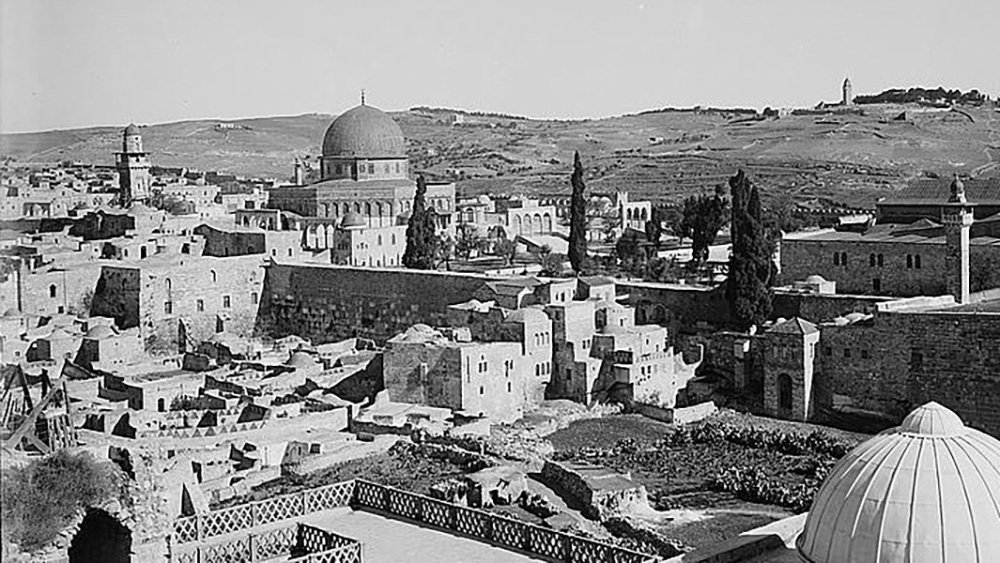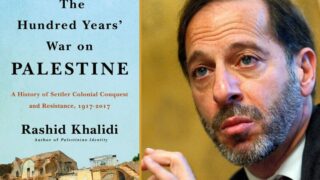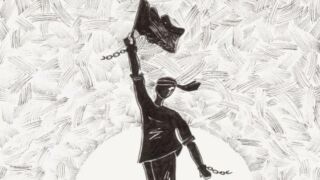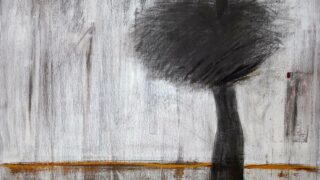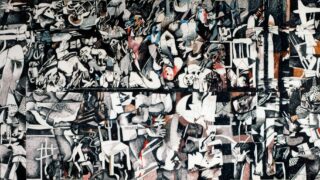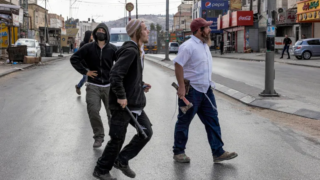The International Commission for the Wailing Wall has the honour to submit the following report to His Britannic Majesty's Government.
The Commission understands that a copy of the report will be forwarded to the Council of the League of Nations. December, 1930
Introduction
"After the disturbances which occurred in Palestine in August, 1929, His Britannic Majesty's Secretary of State for the Colonies appointed a Commission on the 13th of September to enquire into the immediate causes that had led to that outbreak and to make recommendations as to the steps necessary to avoid a recurrence.
The said Commission of Enquiry communicated to the Secretary of State for the Colonies amongst other desiderata, in December, 1929, a recommendation that His Majesty's Government should take such steps as lay within their power to secure the early appointment, under Article 14 of the Mandate for Palestine, of an ad hoc Commission to determine the rights and claims in connection with the Wailing Wall in Jerusalem. It was the view of the Commission of Enquiry that an early determination of rights and claims connected with the Wailing Wall was a measure essential in the interests of peace and good government in Palestine. The Commission considered, therefore, that the constitution of a Commission for the said purpose and its departure for the country should be expedited by every possible means.
The members of the Commission assembled for the first time at Genoa on the 12th of June and sailed for Palestine on the following day, having been furnished before their departure with the various documents relative to matters connected with the Wailing Wall that had up to then been published by the League of Nations and by the British Government (e.g., reports, despatches, memoranda, minutes of proceedings, etc.).
The Commission arrived at Jerusalem on the 19th of June and stayed in Palestine for one month, leaving Jerusalem on the 19th of July. The first meeting of the Commission was held on Monday, the 23rd of June, the 20th and 21st being blank days as Friday and Saturday are kept as holy days by one or other of the Parties concerned. During their stay in Jerusalem the Commission held one or two meetings on practically every weekday, Fridays and Saturdays excepted. In all there were held 23 meetings, of which the first was occupied with introductory speeches and with a discussion as to the procedure to be followed, while the last four meetings were occupied with the closing speeches. At the other 18 meetings the Commission was engaged in the hearing of evidence. All the meetings were held in the Government Offices Building near the Damascus Gate. A complete record of the proceedings is attached hereto (Appendix I).
During the meetings 52 witnesses were examined, 21 of them being called by the Jewish Counsel, 30 by the Moslem Counsel, and 1, a British official, by the Commission. A list of the meetings and of the witnesses whose evidence was given before the Commission is annexed to this Report (Appendix II). During the meetings 61 documents or collections of documents were produced. Of those 35 were presented by the Jewish Side and 26 by the Moslem. A synopsis of them is given in Appendix III."
[...]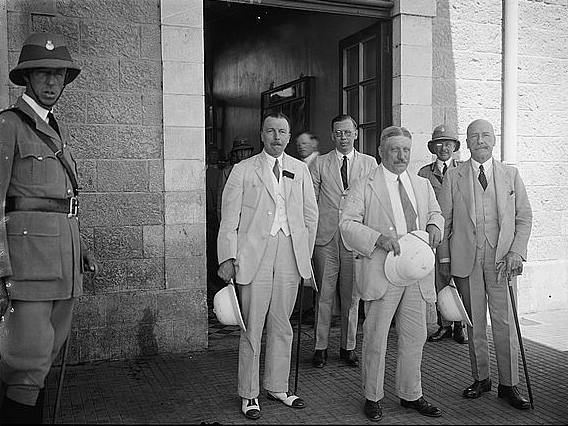
The following is part of a much longer report, which can be viewed in full through the link at the end of the text. We publish here the conclusions reached by this report.
Conclusions
"The conclusions arrived at by the Commission on the basis of the reasoning and evidence adduced above, may be summed up as follows:
A. To the Moslems belong the sole ownership of, and the sole proprietary right to, the Western Wall, seeing that it forms an integral part of the Haram-esh-Sherif area, which is a Waqf property.
To the Moslems there also belongs the ownership of the Pavement in front of the Wall and of the adjacent so-called Moghrabi (Moroccan) Quarter opposite the Wall, inasmuch as the last-mentioned property was made Waqf under Moslem Sharia Law, it being dedicated to charitable purposes.
Such appurtenances of worship and/or such other objects as the Jews may be entitled to place near the Wall either in conformity with the provisions of this present Verdict or by agreement come to between the Parties shall under no circumstances be considered as, or have the effect of, establishing for them any sort of proprietary right to the Wall or to the adjacent Pavement.
On the other hand the Moslems shall be under the obligation not to construct or build any edifice or to demolish or repair any building within the Waqf property (Haram area and Moghrabi Quarter) adjacent to the Wall, in such a manner that the said work would encroach on the Pavement or impair the access of the Jews to the Wall or involve any disturbance to, or interference with, the Jews during the times of their devotional visits to the Wall, if it can in any way be avoided.
B. The Jews shall have free access to the Western Wall for the purpose of devotions at all times subject to the explicit stipulations hereinafter to be mentioned, viz.,
(1) The temporary instructions issued by the Palestine Administration at the end of September, 1929, relative to "appurtenances of worship" (see Section 2, a, b, c), are to be made permanent, subject however to the one modification that it shall be permissible to place near the Wall the Cabinet or Ark containing the Scroll or Scrolls of the Law and the Table on which the Ark stands and the Table on which the Scroll is laid when being read from, but only on the following occasions, viz.,
(a) at any special fast and assembly for public prayer that the Chief Rabbis of Jerusalem may order to be held in the consequence of some public distress or calamity, provided due notice shall have been given by them to the Administration;
(b) on New Year's Day and on the Day of Atonement, and also on any other special "holy days" that are recognised by the Government as such days on which it has been customary for the Ark containing the Scrolls of the Law to be brought to the Wall.
Save as provided in the articles of this Verdict it shall not be permissible to have any appurtenances of worship in the vicinity of the Wall.
(2) No objection or obstacle shall be raised to the Jews, in their individual capacity, carrying with them to the Wall hand-books or other articles customarily used at their devotions either as a general thing or upon special occasions, nor to their wearing such garments as were of old used at their devotions.
(3) The temporarily enacted prohibitions against the bringing to the Wall of benches, carpets or mattings, chairs, curtains and screens, etc., and against the driving of animals at certain hours along the Pavement are to be made absolute, as is also the injunction as to keeping the door at the southern end of the Wall locked during certain hours. The right, however, for Moslems to go to and fro in an ordinary way along the Pavement shall be respected and remain inviolable as hitherto.
(4) It shall be prohibited to bring to the Wall any tent or a curtain or any similar object with a view to placing it there even though for a limited space of time.
(5) The Jews shall not be permitted to blow the ram's horn (Shofar) near the Wall nor cause any other disturbance to the Moslems that is avoidable; the Moslems on the other hand shall not be permitted to carry out the Zikr ceremony close to the Pavement during the progress of the Jewish devotions or to cause annoyance to the Jews in any other way.
(6) It is to be understood that the Administration shall be entitled to give such instructions as they may think fit respecting the dimensions of each of the objects that it is permissible for the Jews to bring to the WalI, respecting the particular days and hours above referred to, and also respecting other details that may be necessary for the adequate and complete carrying out of this present Verdict of the Commission.
(7) It shall be prohibited for any person or persons to make use of the place in front of the Wall or its surroundings for all political speeches or utterances or demonstrations of any kind whatever.
(8) It shall be held to be a matter of common interest to Moslems and Jews alike that the Western Wall should not be disfigured by having any engravings or inscriptions placed upon it or by having nails or similar objects driven into it and also that the Pavement in front of the Wall should be kept clean and be properly respected by Moslems and Jews alike; it is herewith declared to be the Moslems' right and duty to have the Pavement cleaned and repaired, if and when that is necessary, upon due notice being given to the Administration.
(9) Owing to the Wall's character as an historical monument its fitting maintenance shall be entrusted to the Palestine Administration, so that any repairs to it that may be necessary shall be carried out by them and under their supervision though only after consultation with the Supreme Moslem Council and the Rabbinical Council for Palestine.
(10) If any repairs to the Pavement that are necessary are not attended to by the Moslems in due time, the Palestine Administration shall take the necessary steps to have the work done.
(11) The Chief Rabbis of Jerusalem shall be required to nominate one or more officials to be their authorized representative or representatives for receiving the instructions and other communications that will be issued from time to time by the Palestine Administration regarding the Western Wall, the Pavement in front of it, and the formalities to be observed with regard to the Jewish devotions near the Wall.
In regard to the particular case that the Commission has been appointed to inquire into, this lofty principle cannot be put into practice, unless the adherents of the differing creeds are prepared, in observance of the rules set forth above, to show each other due consideration as regards the one Party in the exercise of their incontestable rights of ownership and possession, and as regards the other in the performance of their religious services on a ground which does not belong to them by right of possession.
The Commission ventures to entertain the hope that, having regard to the actual position of affairs and of what is dependent thereupon, both Moslems and Jews will accept and respect the Commission's Verdict with that earnest desire to attain mutual understanding that is so important a pre-requisite both for the furtherance of the common interest of the Parties in Palestine and for ensuring a peaceable development in the World at large.
________
In its pronouncements and decisions the Commission is unanimous.
December, 1930.
ELIEL LÖFGREN.
CHARLES BARDE. C. J. VAN KEMPEN. STIG SAHLIN
Read the entire report: http://tiny.cc/h1csvz

